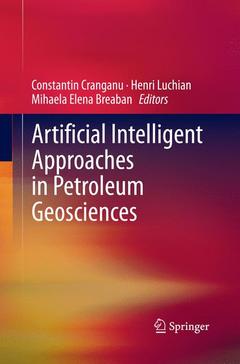Artificial Intelligent Approaches in Petroleum Geosciences, 2015
Coordonnateurs : Cranganu Constantin, Luchian Henri, Breaban Mihaela Elena

This book presents several intelligent approaches for tackling and solving challenging practical problems facing those in the petroleum geosciences and petroleum industry. Written by experienced academics, this book offers state-of-the-art working examples and provides the reader with exposure to the latest developments in the field of intelligent methods applied to oil and gas research, exploration and production. It also analyzes the strengths and weaknesses of each method presented using benchmarking, whilst also emphasizing essential parameters such as robustness, accuracy, speed of convergence, computer time, overlearning and the role of normalization. The intelligent approaches presented include artificial neural networks, fuzzy logic, active learning method, genetic algorithms and support vector machines, amongst others.
Integration, handling data of immense size and uncertainty, and dealing with risk management are among crucial issues in petroleum geosciences. The problems we have to solve in this domain are becoming too complex to rely on a single discipline for effective solutions and the costs associated with poor predictions (e.g. dry holes) increase. Therefore, there is a need to establish a new approach aimed at proper integration of disciplines (such as petroleum engineering, geology, geophysics and geochemistry), data fusion, risk reduction and uncertainty management. These intelligent techniques can be used for uncertainty analysis, risk assessment, data fusion and mining, data analysis and interpretation, and knowledge discovery, from diverse data such as 3-D seismic, geological data, well logging, and production data. This book is intended for petroleum scientists, data miners, data scientists and professionals and post-graduate students involved in petroleum industry.
Constantin Cranganu is a professor of geophysics and petroleum geology at Brooklyn College of the City University of New York. He obtained a PhD degree (ABD) from the University of Bucharest, Romania (1993) in geophysics and another PhD from the University of Oklahoma (1997) in geology.
Before coming to Brooklyn College, he worked at “Al. I. Cuza” University of Iasi, Romania and the School of Geology and Geophysics of University of Oklahoma. His main research covers various areas of petroleum geosciences: oil and gas generation, abnormal fluid pressures in sedimentary basins, gas hydrate exploitation, identification of gas-bearing layers using well logs, geostatistics, etc. Lately, Prof. Cranganu started using artificial intelligent approaches in his petroleum-related research. He published many books, peer-reviewed articles, book reviews and essays. His paper, “Using gene expression programming to estimate sonic log distributions based on the natural gamma ray and deep resistivity logs: A case study from the Anadarko Basin, Oklahoma”, (co-author Elena Bautu), published in Journal of Petroleum Science and Engineering in 2012 was nominated for ENI Awards 2012.
Mihaela Elena Breabăn is an Associate Professor at the Faculty of Computer Science, “Alexandru Ioan Cuza” University of Iași, Romania. She is teaching Databases and topics in Probabilities and Statistics, Data Mining and Natural Computing. She obtained her PhD in 2011 from Al.I.Cuza University with a thesis on unsupervised data analysis focused on clustering and feature selection. Post-doctoral research she conducted during Oct. 2011-Mar.2013 was focused on the subject of feature extraction. She conducted research periods at the National University of Seoul (2008), University of Massachusetts at Boston (2010), University of Coimbra (2012) and Goldsmiths University (UK, 2013). She was member in several research projects (CNCSIS-A national grant, CNCSIS-PNII 11-028/2007partnership among national
Date de parution : 10-2016
Ouvrage de 290 p.
15.5x23.5 cm
Mots-clés :
Artificial Neural Networks in Petroleum Geosciences; Genetic Algorithms in Petroleum Geosciences; Intelligent Approaches in Petroleum Geosciences; Petroleum Geosciences Artificial Intelligence; Petroleum Geosciences Knowledge Discovery; Petroleum Geosciences Machine Learning; mineral resources



